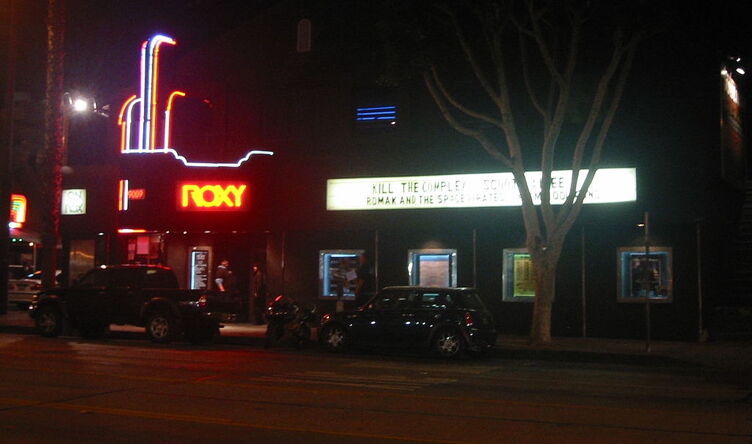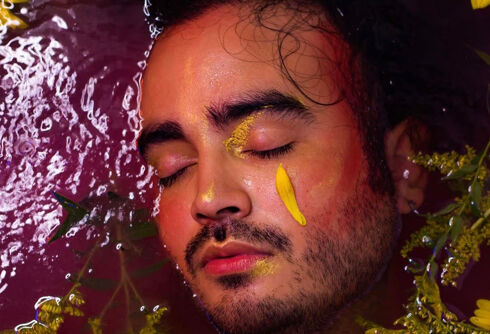At the climax of the 1978 stoner film Cheech & Chong’s Up in Smoke, the then 32-year-old Mexican-American actor Cheech Marin fills Los Angeles’ crowded Roxy Theatre with cannabis smoke before shredding an electric guitar onstage — ready to compete in a Battle of the Bands.
Marin’s wayward hippy character is performing as “Alice Bowie,” a mashup of goth rocker Alice Cooper and glam musician David Bowie. He struts around in a sequined eye mask, Mickey Mouse ears, knee-high socks, a garter, and a matching pink one-piece bathing suit and tutu.
Related:
These 7 queer Hispanic musicians are blazing trails for bold self-expression
They’re ripping apart the strict gender roles that have long shaped Hispanic life.
“My daddy, he disowned me ’cause I wear my sister’s clothes — he caught me in the bathroom with a pair of pantyhose,” he sings in a punk rock style. Behind him, three trumpeters play as his stoner buddy, Tommy Chong, plays drums with oversized drumsticks.
Never Miss a Beat
Subscribe to our newsletter to stay ahead of the latest LGBTQ+ political news and insights.
“My basketball coach, he done kicked me off the team — for wearin’ high-heel sneakers and actin’ like a queen,” he continues singing. “And it don’t bother me if people think I’m ‘funny.’ ‘Cause I’m a big rock star and I’m makin’ lots of money.”
Critics panned the 1978 B-comedy for its under-written script, its slapstick and toilet humor. But its inclusion of this pro-gay punk rock song, entitled “Earache My Eye” — and its progressive embrace of effeminacy — made a notable cultural impact, topping music charts and being covered by latter-day musicians.
By Up in Smoke‘s premiere, Cheech & Chong had already become well-known as a peaceful, mischievous, and fun-loving stoner duo in the 1970’s drug-fueled countercultural movement. They had released five comedic albums, including their 1973 Los Cochinos (The Pigs), which won Best Comedy Recording at the 16th Annual Grammy Awards.
Their 1974 record, Cheech & Chong’s Wedding Album, first featured the song “Earache My Eye.” It was part of an audio skit in which Marin played a teenager rocking out to Alice Bowie’s song instead of getting ready for school. When his angry father bursts into his bedroom, demanding that he get his “fanny perpendicular” and ready for school, the teen claims he has an earache.
“Earache my eye!” the father responds. “How would you like a butt-ache?”
The mouthy teenager talks back to his father until his dad hits him with a belt (weakly). The teen then pretends to cry, and his dad leaves. But as soon as his dad is gone, he stops his fake crying and continues playing the song.
An edited version of the skit and song gained massive popularity after its release, reaching #9 on the Billboard charts in the U.S. and #4 in Chong’s home country of Canada. The radio version also reportedly prompted concerned calls from parents, educators, and radio advertisers who worried about the artists encouraging kids to disobey their parents, skip school, and smoke weed.
Queer punk rock found Latino flavor in Cheech’s L.A.
The nervous nellies who complained about the song likely neither knew nor cared that punk rock has always had a defiantly pro-queer edge.
Numerous early tracks in the genre bear this out: In 1976, The Ramones’ “53rd and 3rd” sang the laments of a never-picked gay hustler. The Buzzcocks’ 1977 “Orgasm Addict” was a pansexual anthem. Wayne County & The Electric Chairs’ 1978 song “Man Enough to Be a Woman” contemplated the bravery needed to live as an out transgender woman.
It made sense for punk music to be queer-inclusive. The word “punk” itself has a rather queer triple meaning: It’s an abusive term for “a worthless person” and slang for “a young man who plays the feminine role in a homosexual relationship.”
It also, of course, refers to the loud, fast, aggressive late ’70s and early ’80s musical genre that stuck its middle finger at respectability politics and classical music training. Its loud, crass, growling rage championed underdogs; mocked, screamed at, and spit on agents of oppression and conformity.
Several Latino punk bands emerged in Marin’s hometown of Los Angeles by Up in Smoke‘s 1978 premiere, including The Plugz, The Bags, Los Illegals, and the Stains. These bands added Latino instrumentation to punk anger, crafting protest songs about the angst of growing up Chicano (that is, an American of Mexican origin).
Up in Smoke mirrored that angst: In it, Chong plays Anthony, a man whose family threatens him with military school if he doesn’t find a job by sundown. Anthony ends up stranded. He hitchhikes and is picked up by Marin’s character Pedro. The duo gets deported to Tijuana, Mexico by U.S. immigration enforcement officers and then ends up smuggling a van made of weed back into the United States. Overzealous drug enforcement agents pursue them, but end up too stoned and stuffed on pizza to bother catching the pothead criminals.
As much as punk rock influenced the anti-establishment politics of Cheech & Chong’s debut film, the music genre also laid the groundwork for the “queercore” and “riot grrrl” music movements of the late ’80s and early ’90s — both of which resisted the homonormativity of mainstream LGBTQ+ activists who wanted inclusion in the military, marriage, and middle management.
The Roxy Theater was a cradle for subversive queer art

The film’s setting of the Roxy Theater for its climax also had its own queer edge. The one-time strip club sits in the very gay city of West Hollywood outside of Los Angeles. It was frequented by Elton John and many other musicians and actors of every sexual persuasion.
The theater hosted the first-ever U.S. stage production of The Rocky Horror Show in 1974. In 1981, comedian Paul Ruebens staged his first performances there as his gay-encoded boy-man persona Pee-wee Herman. (Rueben would later appear in Cheech & Chong’s second and third films.) The Roxy was also the site of Los Angeles’ first-ever AIDS benefit on July 27, 1983.
“Earache My Eye” embraced the Roxy and its queer spirit. Even though Marin’s character Pedro isn’t explicitly shown as gay, his song nevertheless rejects patriarchal gender conforming and macho athleticism and instead celebrates the subversive fun of “actin’ like a queen.”
Notably, the duo’s many films didn’t lean into homophobic tropes that were exceedingly common in other 1970s films.
Throughout the decade, movies depicted gay men and other queer people as tragically depressed, like in The Boys in the Band; sexually deranged, like in Myra Breckinridge, The Rocky Horror Picture Show, Pink Flamingos, Caligula, and 120 Days of Sodom; or downright criminal, like in Vanishing Point, Caged Heat, Deliverance, and Dog Day Afternoon. Even compassionate depictions, like in A Very Natural Thing and The Ritz, were given R-ratings and written off by critics as boring, heavy-handed, and “political.”
Made on a budget of $1.8 million, Cheech and Chong’s Up in Smoke film went on to gross over $100 million. It became a cult classic and an early example of the stoner comedy genre whose modern films include Half Baked (1998), Scary Movie (2000), Harold & Kumar Go to White Castle (2004), as well as numerous other stoner flicks that have often smoked out, sidelined, or satirized their queer characters.
As a testament to its influence, “Earache My Eye” went on to be covered by other musicians and groups, including Widespread Panic, Korn, Soundgarden, and The Seth Rollins Band. The counter-cultural hip-hop group 2 Live Crew also sampled the song on their 1989 album As Nasty As They Wanna Be.
As for Cheech and Chong, Up in Smoke marked their film acting debuts as well as the start of their nearly four-decade-long acting careers. The stoners went on to numerous other on-screen roles as well as voice-acting roles in The Lion King and Zootopia, two animated children’s films made by Disney, a corporation that — like Cheech & Chong’s song — has since been accused of encouraging degeneracy among the youth.















